Russian film and stage actor Vasili Kachalov (1875-1948) was one of Konstantin Stanislavsky's best-known performers. He led the so-called Kachalov Group within the Moscow Art Theatre. It was Kachalov who played Hamlet in the legendary Symbolist production of 1911. He also appeared in four films.

Russian postcard. Sent by mail in 1904. Collection: Didier Hanson.

Yugoslavian postcard, probably ca. 1920. Photo: Foto Atelier Tonka, Zagreb. Collection: Didier Hanson.

Russian postcard. Vasily Kachalov as Julius Caesar and Alexander Vishnevsky as Mark Antony in William Shakespeare's play 'Julius Caesar', staged in 1903 at the Moscow Art Theatre and directed by Vladimir Nemirovich-Danchenko. Constantin Stanislavsky played Brutus, though other sources state it was Vasily Luzhsky who played that part.
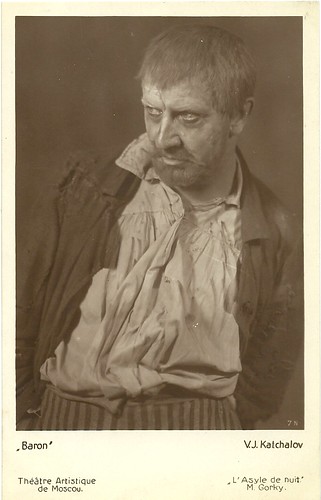
French postcard, no. 7 N. Photo: Moscow Art Theatre. Publicity still for the play Na dne (The Lower Depths, 1902) by Maxim Gorky with Vasili Kachalov as the Baron. Collection: Didier Hanson.

Russian postcard. Collection: Didier Hanson.

Russian postcard. Collection: Didier Hanson.
Vasili (or Vachily) Kachalov (Василий Качалов) was born as Vasili Ivanovich Shverubovich in Vilnius, Russian Empire (now Lithuania), in 1875. His father was Ivan Shverubovich, a Belarusian Orthodox priest from Wilno. His schoolmates at the local college included the future statesman Felix Dzerzhinsky.
In 1896, he left the law department of Saint Petersburg University to pursue an acting career. After four years of touring the Russian provinces and a brief stint at the Suvorin Theatre, Kachalov made his debut at the Moscow Art Theatre as Tsar Berendey in 'Vesennyaya Skazka' (The Snow Maiden - 1900) by Alexander Ostrovsky.
The snow maiden was played by Stanislavsky's wife, Maria Lilina, who fell in love with Kachalov. She later described their affair as "a touch of private happiness". Another of his lovers was actress Alisa Koonen. He met his wife, actress Nina Litovtseva when they were acting in the Kazan Drama Theatre, one of Russia's oldest theatres.
Vasili Kachalov was greatly admired for his ‘magnetic’ voice. He played Baron Tuzenbach in 'Tri sestry' (Three Sisters) by Anton Chekhov after Vsevolod Meyerhold departed from the theatre. In the original 1904 production of Chekhov’s 'Vishnyovyy sad' (The Cherry Orchard) he appeared as Trofimov. He played Hamlet in the Symbolist Stanislavsky–Craig production of 1911.
Kachalov also performed leading roles in productions directed by Nemirovich-Danchenko. He starred in Nemirovich-Danchenko's production of Chekhov’s Ivanov (1904). He also appeared as the Baron in Gorky's 'Na dne' (The Lower Depths, 1902), as William Shakespeare’s 'Julius Caesar' in 1903, as Henrik Ibsen's 'Brand' in 1906, and as Ivan Karamazov in Fyodor Dostoyevsky‘s 'Brat'ya Karamazovy' (The Brothers Karamazov) in 1910.

Russian postcard, no. 10682. Photo: Vasili Kachalov as Anathema in the stage play 'Anathema' (1909) at The Moscow Art Theatre, Moscow, Russia. Collection: Didier Hanson.
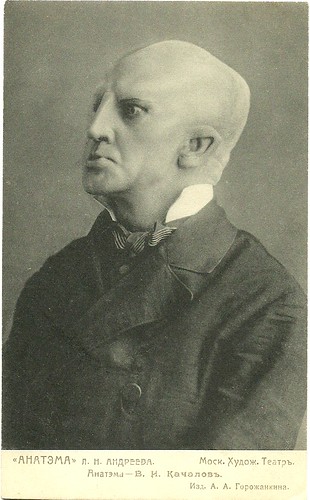
Russian postcard. Vasili Kachalov as Anathema in the prologue of the play 'Anathema' (1909) by Leonid Andreev at The Moscow Art Theatre, Moscow, Russia. Collection: Didier Hanson.
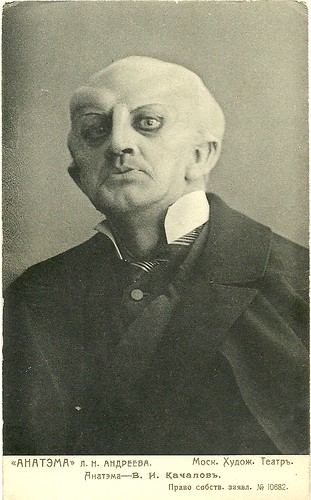
Russian postcard. Vasili Kachalov as Anathema in the prologue of the play 'Anathema' (1909) by Leonid Andreev at The Moscow Art Theatre, Moscow, Russia. Collection: Didier Hanson.
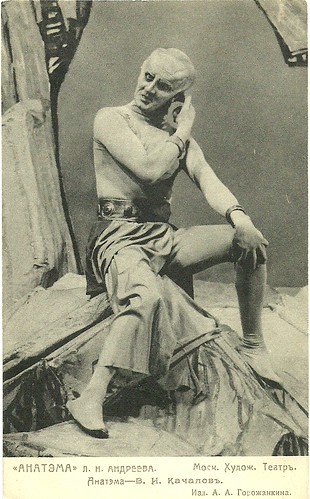
Russian postcard. Photo: K. Fischer, Gorozhankin, Russia. Vasili Kachalov as Anathema in the prologue of the play 'Anathema' (1909) by Leonid Andreev at The Moscow Art Theatre, Moscow, Russia. Collection: Didier Hanson.
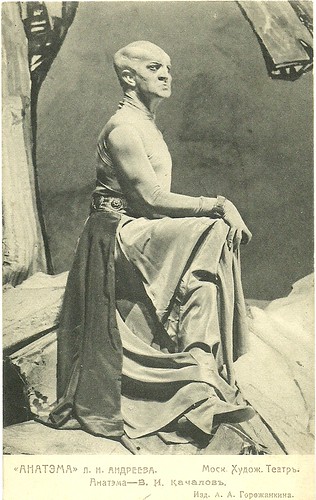
Russian postcard. Photo: K. Fischer, Gorozhankin, Russia. Vasili Kachalov as Anathema in the prologue of the play 'Anathema' (1909) by Leonid Andreev at The Moscow Art Theatre, Moscow, Russia. Collection: Didier Hanson.
After the Russian Revolution, Vasili Kachalov and the Kachalov Group went touring Central Europe and did not return until the summer of 1921, under pressure from the theatre's founders. Vasili Kachalov appeared in a few films. The silent Soviet film Belyy oryol/The Lash of the Czar (Yakov Protazanov, 1928) is based on a short story by Leonid Andreyev. Kachalov’s co-stars were Anna Sten and Vsevolod Meyerhold.
His other films include the war drama Giorgi Saakadze/Georges Saakadzé (Mikheil Chiaureli, 1942) – in which only his voice is heard - and Mastera stseny/Stars of the Moscow Art Theater (Vladimir Yurenev, 1949).
This anthology film consisted of three segments of famous plays by Maxim Gorky, Alexei Tolstoy and Anton Chekhov. Kachalov appeared as Gayev opposite Olga Knipper-Chekhova in a segment of Chekhov’s 'Vishnyovyy sad' (The Cherry Orchard).
In 1945 Vasili Kachalov was the narrator of the animation film Propavshaya gramota/The Lost Letter (Valentina Brumberg, Lamis Bredis, Zinaida Brumberg, 1945) based on a novel by Nikolai Gogol.
Kachalov was named one of the first People's Artists of the USSR after the title was instituted in 1936 and received a Stalin Prize in 1943. He was also the recipient of the two Orders of Lenin. Vasili Kachalov died in 1948 in Moscow, USSR (now Russia). The Kazan State Theatre was given his name later that year.

Russian postcard. Vasili Kachalov as Ivan in 'The Brothers Karamazov' by Fyodor Dostoevsky. Collection: Didier Hanson.

Russian postcard. Photo: Moscow Art Theatre. Publicity still for the stage play Tri sestry/Three Sisters by Anton Chekhov. It was written in 1900 and first performed in 1901 at the Moscow Art Theatre. Kachalov played the part of Baron Nikolaj Lvovich Tuzenbach. Collection: Didier Hanson.

Russian postcard, no. 8572. Photo: publicity still for the Moscow Art Theatre production of 'The Lower Depths' (1902) by Maxim Gorky, with Ivan Moskvin as Luka and Vasili Kachalov as the Baron. Collection: Didier Hanson.

Russian postcard. Vasili Kachalov in the play 'In Life's Clutches' (1911) by Knut Hamsun. Collection: Didier Hanson.

Russian postcard. Photo: Vasili Kachalov as Hamlet in The Moscow Art Theatre (MAT) production of 'Hamlet' in 1911–1912. Collection: Didier Hanson.
Sources: Oxford Encyclopedia of Theatre and Performance (Answers.com - Now defunct), Wikipedia (English and French) and IMDb.
This post was last updated on 1 December 2024.

Russian postcard. Sent by mail in 1904. Collection: Didier Hanson.

Yugoslavian postcard, probably ca. 1920. Photo: Foto Atelier Tonka, Zagreb. Collection: Didier Hanson.

Russian postcard. Vasily Kachalov as Julius Caesar and Alexander Vishnevsky as Mark Antony in William Shakespeare's play 'Julius Caesar', staged in 1903 at the Moscow Art Theatre and directed by Vladimir Nemirovich-Danchenko. Constantin Stanislavsky played Brutus, though other sources state it was Vasily Luzhsky who played that part.

French postcard, no. 7 N. Photo: Moscow Art Theatre. Publicity still for the play Na dne (The Lower Depths, 1902) by Maxim Gorky with Vasili Kachalov as the Baron. Collection: Didier Hanson.

Russian postcard. Collection: Didier Hanson.

Russian postcard. Collection: Didier Hanson.
Magnetic voice
Vasili (or Vachily) Kachalov (Василий Качалов) was born as Vasili Ivanovich Shverubovich in Vilnius, Russian Empire (now Lithuania), in 1875. His father was Ivan Shverubovich, a Belarusian Orthodox priest from Wilno. His schoolmates at the local college included the future statesman Felix Dzerzhinsky.
In 1896, he left the law department of Saint Petersburg University to pursue an acting career. After four years of touring the Russian provinces and a brief stint at the Suvorin Theatre, Kachalov made his debut at the Moscow Art Theatre as Tsar Berendey in 'Vesennyaya Skazka' (The Snow Maiden - 1900) by Alexander Ostrovsky.
The snow maiden was played by Stanislavsky's wife, Maria Lilina, who fell in love with Kachalov. She later described their affair as "a touch of private happiness". Another of his lovers was actress Alisa Koonen. He met his wife, actress Nina Litovtseva when they were acting in the Kazan Drama Theatre, one of Russia's oldest theatres.
Vasili Kachalov was greatly admired for his ‘magnetic’ voice. He played Baron Tuzenbach in 'Tri sestry' (Three Sisters) by Anton Chekhov after Vsevolod Meyerhold departed from the theatre. In the original 1904 production of Chekhov’s 'Vishnyovyy sad' (The Cherry Orchard) he appeared as Trofimov. He played Hamlet in the Symbolist Stanislavsky–Craig production of 1911.
Kachalov also performed leading roles in productions directed by Nemirovich-Danchenko. He starred in Nemirovich-Danchenko's production of Chekhov’s Ivanov (1904). He also appeared as the Baron in Gorky's 'Na dne' (The Lower Depths, 1902), as William Shakespeare’s 'Julius Caesar' in 1903, as Henrik Ibsen's 'Brand' in 1906, and as Ivan Karamazov in Fyodor Dostoyevsky‘s 'Brat'ya Karamazovy' (The Brothers Karamazov) in 1910.

Russian postcard, no. 10682. Photo: Vasili Kachalov as Anathema in the stage play 'Anathema' (1909) at The Moscow Art Theatre, Moscow, Russia. Collection: Didier Hanson.

Russian postcard. Vasili Kachalov as Anathema in the prologue of the play 'Anathema' (1909) by Leonid Andreev at The Moscow Art Theatre, Moscow, Russia. Collection: Didier Hanson.

Russian postcard. Vasili Kachalov as Anathema in the prologue of the play 'Anathema' (1909) by Leonid Andreev at The Moscow Art Theatre, Moscow, Russia. Collection: Didier Hanson.

Russian postcard. Photo: K. Fischer, Gorozhankin, Russia. Vasili Kachalov as Anathema in the prologue of the play 'Anathema' (1909) by Leonid Andreev at The Moscow Art Theatre, Moscow, Russia. Collection: Didier Hanson.

Russian postcard. Photo: K. Fischer, Gorozhankin, Russia. Vasili Kachalov as Anathema in the prologue of the play 'Anathema' (1909) by Leonid Andreev at The Moscow Art Theatre, Moscow, Russia. Collection: Didier Hanson.
The lost letter
After the Russian Revolution, Vasili Kachalov and the Kachalov Group went touring Central Europe and did not return until the summer of 1921, under pressure from the theatre's founders. Vasili Kachalov appeared in a few films. The silent Soviet film Belyy oryol/The Lash of the Czar (Yakov Protazanov, 1928) is based on a short story by Leonid Andreyev. Kachalov’s co-stars were Anna Sten and Vsevolod Meyerhold.
His other films include the war drama Giorgi Saakadze/Georges Saakadzé (Mikheil Chiaureli, 1942) – in which only his voice is heard - and Mastera stseny/Stars of the Moscow Art Theater (Vladimir Yurenev, 1949).
This anthology film consisted of three segments of famous plays by Maxim Gorky, Alexei Tolstoy and Anton Chekhov. Kachalov appeared as Gayev opposite Olga Knipper-Chekhova in a segment of Chekhov’s 'Vishnyovyy sad' (The Cherry Orchard).
In 1945 Vasili Kachalov was the narrator of the animation film Propavshaya gramota/The Lost Letter (Valentina Brumberg, Lamis Bredis, Zinaida Brumberg, 1945) based on a novel by Nikolai Gogol.
Kachalov was named one of the first People's Artists of the USSR after the title was instituted in 1936 and received a Stalin Prize in 1943. He was also the recipient of the two Orders of Lenin. Vasili Kachalov died in 1948 in Moscow, USSR (now Russia). The Kazan State Theatre was given his name later that year.

Russian postcard. Vasili Kachalov as Ivan in 'The Brothers Karamazov' by Fyodor Dostoevsky. Collection: Didier Hanson.

Russian postcard. Photo: Moscow Art Theatre. Publicity still for the stage play Tri sestry/Three Sisters by Anton Chekhov. It was written in 1900 and first performed in 1901 at the Moscow Art Theatre. Kachalov played the part of Baron Nikolaj Lvovich Tuzenbach. Collection: Didier Hanson.

Russian postcard, no. 8572. Photo: publicity still for the Moscow Art Theatre production of 'The Lower Depths' (1902) by Maxim Gorky, with Ivan Moskvin as Luka and Vasili Kachalov as the Baron. Collection: Didier Hanson.

Russian postcard. Vasili Kachalov in the play 'In Life's Clutches' (1911) by Knut Hamsun. Collection: Didier Hanson.

Russian postcard. Photo: Vasili Kachalov as Hamlet in The Moscow Art Theatre (MAT) production of 'Hamlet' in 1911–1912. Collection: Didier Hanson.
Sources: Oxford Encyclopedia of Theatre and Performance (Answers.com - Now defunct), Wikipedia (English and French) and IMDb.
This post was last updated on 1 December 2024.
No comments:
Post a Comment